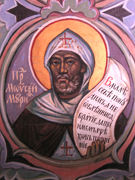Seven instructions which Abba Moses sent to Abba Poeman. He who puts them into practice will escape all punishment and will live in peace, whether he dwells in the desert or in the midst of the brethren.
 1. The monk must die to his neighour and never judge him at all, in any way whatever.
1. The monk must die to his neighour and never judge him at all, in any way whatever.
2. The monk must die to everything before leaving the body, in order not to harm anyone.
3. If the monk does not think in his heart that he is a sinner, God will not hear him. The brother said, ‘What does that mean, to think in his heart that he is a sinner?’ Then the old man said, ‘When someone is occupied with his own faults, he does not see those of his neighbor.’
4. If a man’s deeds are not in harmony with his prayer, he labors in vain. The brother said, ‘What is this harmony between practice and prayer?’ The old man said, ‘We should no longer do those things against which we pray. For when a man gives up his own will, then God is reconciled with him and accepts his prayers.’ The brother asked, ‘In all the affliction which the monk gives himself, what helps him?’ The old man said, ‘It is written, “God is our refuge and strength, a very present help in trouble.”‘ (Ps.46.1)
5. The old man was asked, ‘What is the good of the fasts and watchings which a man imposes on himself?’ and he replied, ‘They make the soul humble. For it is written, “Consider my affliction and my trouble, and forgive all my sins.” (Ps.25.18) So if the soul gives itself all this hardship, God will have mercy on it.’
6. The old man was asked, ‘What should a man do in all the temptations and evil thoughts that come upon him?’ The old man said to him, ‘He should weep and implore the goodness of God to come to his aid, and he will obtain peace if he prays with discernment. For it is written, “With the Lord on my side I do not fear. What can man do to me?”‘(Ps. 118.6)
7. A brother asked the old man, ‘Here is a man who beats his servant because of a fault he has committed; what will the servant say?’ The old man said, ‘If the servant is good, he should say, “Forgive me, I have sinned.”‘ The brother said to him, ‘Nothing else?’ The old man said, ‘No, for from the moment he takes upon himself responsibility for the affair and says, “I have sinned,” immediately the Lord will have mercy on him. The aim of these things is not to judge one’s neighbor. For truly, when the hand of the Lord caused the first-born in the land of Egypt to die, no house was without its dead.’ The brother said, ‘What does that mean?’The old man said, ‘If we are on the watch to see our own faults, we shall not see those of our neighbor. It is folly for a man who has a dead person in his house to leave him there and to go and weep over his neighbor’s dead. To die to one’s neighbor is this: To bear your own faults and not to pay attention to anyone else wondering whether they are good or bad. Do no harm to anyone, do not think anything bad in your heart towards anyone, do not scorn the man who does evil, do not put confidence in him who does wrong to his neighbor, do not rejoice with him who injures his neighbor. This is what dying to one’s neighbor means. Do not rail against anyone, but rather say, “God knows each one.” Do not agree with him who slanders, do not rejoice at his slander and do not hate him who slanders his neighbor. This is what it means not to judge. Do not have hostile feelings to anyone and do not let dislike dominate your heart; do not hate him who hates his neighbor. This is what peace is: Encourage yourself with this thought, “Affliction lasts but a short time, while peace is for ever, by the grace of God the Word. Amen.”
The Sayings of the Desert Fathers. The Alphabetical Collection, translated by Benedicta Ward, SLG, (Kalamazoo: Cistercian Publications, 1975 [1984]) 141-143.
